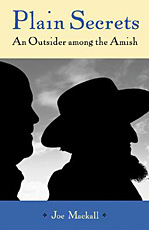"More than anything else, I believe some modern folks loathe the Amish because they're a flesh-and-blood symbol of all America has rejected and all the Amish reject of America. The Amish are perceived as being anti-progress, as refuting the economy we've created, and a society we've accepted. I believe those who loathe the Amish feel guilty because the Amish take care of their elderly and sick without the help of the state or the cost of insurance. They don't like the fact that the Amish have far fewer expenses than the rest of us do and that they've bought up so much land over the years. They're bothered by the fact that the Amish have no car or house payments to make, no insurance premiums, no jobs they hate, no retirement they're aching for, no nursing homes, no extravagant health-care costs.
"They especially don't want the Amish to get any special treatment, particularly if their taxes have to pay for it. Buggy lanes, for example. In some areas heavily populated with buggies, municipalities have considered adding buggy lanes to the roads, which would be for buggies only and would not cut into car lanes. Because this always involves money, of course, not to mention numerous residents selling or giving up sections of their land that meet the road, the issue has come up and gone away several times. An Ohio representative proposed a bill in 2001 that would have helped the twenty-one counties that are home to the state's Amish. The bill was designed to help pay for wider berms and for educating English about driving safely in Amish country. September 11 of that year eclipsed the bill. Although there was only one fatal buggy accident in 2005 — there have already been two in 2006 — there were still 148 buggy accidents that year. In 2001, when the bill was proposed, buggies were involved in 129 accidents. Buggy-on-buggy accidents are unheard of, and if they happen, they're not reported.
"Some deriders of the Amish are under the impression that the Amish do not pay taxes, which is not true. They pay real estate, federal, state, and local taxes and refuse government farm subsidies. This does not mean that every single Amish person pays income taxes, in the same way not every non-Amish person pays taxes. But the Amish are required by law to pay taxes, and the Amish I know do not seek out trouble; they figure enough of it will come their way without their going to look for it. The Amish do not pay into Social Security, nor do they accept any Social Security benefits. (An Amish man who hires English workers does have to pay into Social Security for them.) A number of Amish bishops petitioned the government, citing a Bible passage that reads as follows: 'But if any provide not for his own, and specially for those of his own house, he hath denied the faith, and is worse than an infidel' (1 Tim. 5:8). After all, it's the job of the community to care for its elderly. The Amish also eschew any kind of insurance, be it home or life. As Kraybill writes, 'insurance programs — especially life insurance plans — are viewed as gambling ventures that seek to plan and protect one's fortunes rather than yield them to the will of God.'
"Samuel has told me numerous times that he has all the insurance he needs and it is his church. When a tornado touched down on a neighboring farm in November of 2004, an Amish barn was destroyed. Within a week, a new barn was rebuilt by a crew made up of just about every able-bodied Amish man in the vicinity. The owner of the barn was expected to buy the material, if possible; otherwise a collection would be made. I have witnessed the community in action many times over the years. The community takes care of everybody within it from the cradle to the grave. My wife and I have chastised ourselves for not being involved enough in our community of neighbors, friends, and colleagues. The Amish have taught us something about what it means to watch out for each other. When we had a family of skunks living under our shed, Samuel came over unannounced on a ninety-degree day after a long afternoon spent working on his chicken coop. He parked his two plow horses and his wagon in our driveway. He dug up dirt to use as a barrier, so the skunks wouldn't be able to escape once the smoke bombs went off. By the time he left to do his evening chores, his shirt was drenched and he had helped a helpless English friend. Their dedication to community often stretches well beyond their own.”
